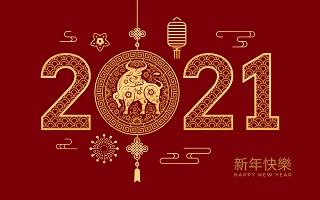Celebrating the Lunar New Year
Posted on February 2nd, 2021 by Connor Blay
One of the most valued traditions in the world across all cultures is, of course, the Lunar New Year and we couldn’t be more excited about the start of the celebration happening next week. For those of you who may not be familiar with this tradition and how it’s celebrated, we’ve got you covered!
What is the Lunar New Year?
While we said “the Chinese New Year” previously, we would like to correct that as we were reminded that the Lunar New Year is the proper inclusive name for this incredible tradition. It’s important for us to make this correction as we know that the Lunar New Year celebrated in several countries other than China including Korea, Vietnam, Laos, Singapore and many others all over the world.
The Lunar New Year or The Spring Festival marks the beginning of the year according to the Lunar calendar and also marks the transition between zodiac signs. Last year was the year of the Rat and this year is the year of the Ox. The celebration officially starts on February 12th and lasts up to 16 days.
What Does Year of the Ox Symbolize?
The Ox is meant to symbolize hard work, intelligence, honesty and reliability while remaining humble. In ancient Chinese culture, the Ox was a valued animal because of its contributions to agriculture. If you are born in the year of the Ox, you are considered to take on Ox traits. Recent years associated with the Ox are 1925, 1937, 1949, 1961, 1973, 1985, 1997, 2009 and, of course, 2021.
Although Oxen have mostly positive traits, unfortunately, 2021 is believed to be a challenging year for the Ox. It is believed that Oxen will face stress in their careers and studies. However, the heavenly stem Xin of 2021 belongs to Metal which can help the Ox. It’s suggested that this year, Oxen should take time to make connections with friends and family in order to manage this stress and gain a better appreciation for their possessions.
How is the Lunar New Year Celebrated?
As mentioned above, the celebration of the Lunar New Year begins on February 12th and lasts for up to 16 days. The first 7 of those days are recognized as a public holiday in which people don’t have to work or go to school. Stores are also closed for the first 5 days so people have to stock up on food and whatever other essential items are needed to survive over that time period.
Over the course of The Spring Festival, each day represents a different tradition, leading up to the Lantern Festival which closes out the celebration. Each of these traditions hold meaning and are celebrated differently. Here’s a little more about each:
February 4th: Little Year (小年 / xiǎo nián)
This is a day of memorial and prayer. On this day, people clean their houses in order to get rid of any bad luck and they also pray to the stove god. Traditionally, the food is sugar melons, a malt that is only for this day.
February 11th: New Year’s Eve (除夕 / chúxì)
This is a day to feast. “The reunion dinner” takes place and after dinner, children receive red envelopes. Everyone likes to stay up until midnight to bring in the New Year.
February 12th: Spring Festival (春节 / chūn jié)
Originally called “Yuán Dàn (元旦)” which means “the beginning”, this is the first day of New Year’s celebrations. Typically, firecrackers will be let off and people come together to celebrate. The weather, stars and moon on this day are used to predict the fortune of the year in a practice that is known as zhàn suì (占岁).
February 13th: To the in-law’s (迎婿日 / yíng xù rì)
This tradition is for married people. A married woman is supposed to bring her husband and children to her parent’s home. From there, she will hand out crackers and candies to share with the neighbors in order to express her longing for her hometown.
February 14th: Day of the Rat (鼠日 / shǔ rì)
This day is dedicated to the folktales that say this is the day rats are supposed to marry. Grains and crackers are left around the house in order to share with the rats. People go to sleep early on this day to avoid disturbing the “wedding”. They do this so that the rats will not bother them for the rest of the year.
February 15th: Day of the Sheep (羊日 / yáng rì)
According to Chinese mythology, sheep were created by Nǚwā (女娲) on the 4th day. This is a day to pray to the god of wealth. It involves a lot of food including three types of meat, fruits and wine. People open their windows at midnight in order to let the wealth god inside and eat and drink until dawn. Slaughtering sheep on this day is forbidden.
February 16th: Break Five (破五 / pò wǔ)
On this day, stores and markets are allowed to reopen after people have prayed to the wealth god. It’s tradition to eat dumplings for the next five days, however, in recent times a lot of people will just have dumplings on this day.
February 17th: Day of the Horse (马日 / mǎ rì)
People can go back to work on this day which is meant to send the spirit of poverty away. The god of bathrooms is said to check the sanitary conditions so often people will clean for the entire day.
February 18th: Day of the Human (人日 / rén rì)
According to Chinese mythology, on the 7th day, Nüwa created humans. During ancient times, it was tradition to wear a hair accessory called rén sheng. People eat Seven Gem Porridge which is made up of seven different types of vegetables and leaf vegetables. Good weather on this day is supposed to symbolize a safe and sound year.
February 19th: Day of the Millet (谷日节 / gǔ rì jié)
Pets including fish and birds are set free as a way to show respect to nature. Families will go to rural areas to learn more about agriculture and to gain a better understanding on how to be environmentally-conscious. Good weather symbolizes a fruitful harvest and cloudy weather symbolizes a year of losses.
February 20th: Providence Health (天公生 / tiān gōng shēng)
This day is to celebrate Jade Emperor’s birthday. Jade Emperor is the highest god in Daoism and represents the sky. Today, people will have ceremonies in order to honor him. It is tradition to fast and bathe before praying and women often bring candles to pray at wells, harbors and open spaces.
February 21st: Stone Festival (石头节 / shí tou jié)
The day of the rock is a test of harvest. A clay jar is frozen onto a stone overnight and ten children will carry it around. If the stone stays frozen onto the jar and does not fall, that symbolizes a good harvest.
February 22nd: Son-in-law Day (子婿日 / zǐ xù rì)
This day is meant for fathers to invite their daughters and son-in-law’s over for dinner.
February 16th–18th: Lantern Festival Preparations
The Lantern Festival is very elaborate and takes a lot of setting up. People use this time to buy lanterns and build light sheds.
February 26th: Lantern Festival (元宵节 / yuán xiāo jié)
This is the big celebration to conclude a month of festivities and traditions. People will often play a game called Lantern Riddles which is writing riddles on lanterns for others to find. Lanterns are let off into the sky on the day of the full moon which makes for an incredible spectacle.



